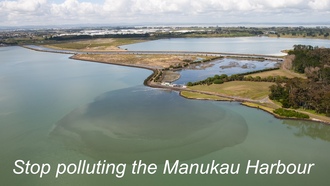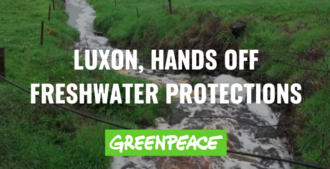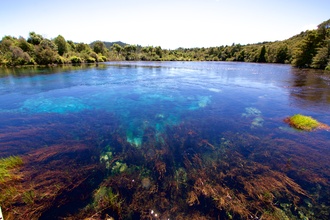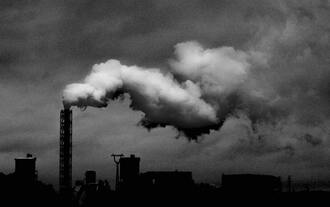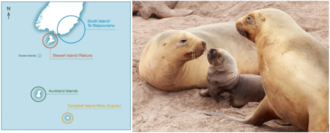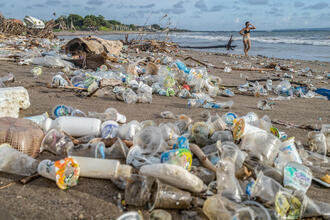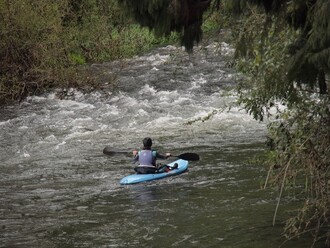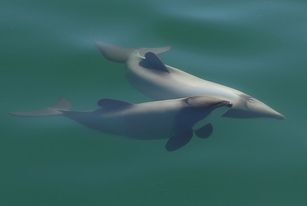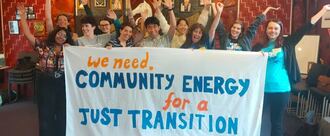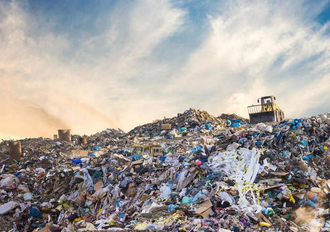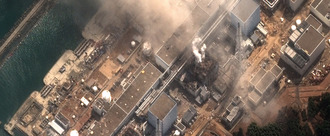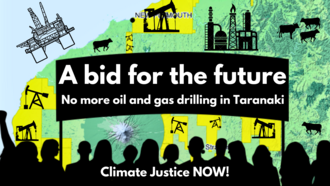-
Stop polluting the Manukau HarbourThe Manukau Harbour is a taonga of Auckland, a vital ecological and cultural asset with huge potential for eco-tourism and recreational use. Yet the Manukau has long been abused as a dumping ground for Auckland’s waste, from landfill reclamations to industrial waste discharges. Currently and inappropriately, our Council uses the Manukau for the discharge of Auckland’s treated wastewater effluent. The shallow and predominantly closed nature of the harbour inhibits the natural flushing of contaminants, resulting in prolonged exposure to pollutants. It is time for this practice to cease, and the mana of the Manukau Harbour be restored. For a start we want Auckland Council to acknowledge the significant harm caused to the Manukau Harbour and its tributaries by the discharge of treated and partially treated wastewater. The Māngere Treatment Plant is the largest freshwater tributary to the Manukau Harbour. Its discharges, and other treatment plant discharges, are severely damaging to this predominantly closed salt water environment. Soon this damage will increase due to higher volumes of treated effluent expected once the Central Interceptor (CI), comes online. Our petition is urging the Government to change the legislation to direct Auckland Council and Watercare to take the necessary steps to ensure Manukau Harbour is free of waste water discharges. Even when treated, wastewater pollution endangers marine life and encourages invasive weeds to smother the sea bed. This pollution leads to eutrophication and habitat degradation, causing significant harm to marine life and ecosystem health. Discharges have resulted in our beaches being closed due to levels of E-coli and other bacteria reaching unhealthy levels for humans to swim in. Contaminated water in the Manukau Harbour presents serious risks to public health. The value of this harbour is diminished due to the negative perceptions caused by continued wastewater pollution. Consents to discharge wastewater into the Manukau have in the past been set with long durations and automatically renewed. We believe it’s time that existing and future discharge consents be limited and alternative solutions need to be put in place so that future discharges to the Manukau Harbour and its tributaries cease to be needed. Action on this is needed now by way of legislative change that enforces the desired outcomes on Auckland Council and its Council Controlled Organisation Watercare, or any other such organisation in the future. By updating the legislation the Government can direct and support Auckland Council and Watercare to: 1. plan for future methods of discharge management so that discharge consents into the Manukau Harbour and its tributaries cease to be needed once current consents lapse. 2. restrict renewed discharge consents from permitting discharges into the Manukau Harbour and its tributaries after a period of 10 years from the date this condition is ratified (allowing Auckland Council and Watercare adequate time to devise and implement alternative solutions). 3. disallow granting of new discharge consents into the Manukau Harbour and its tributaries (excluding renewal consents as conditioned under 1.b). 4. disallow redirection of discharges to other consented outflows into the Manukau Harbour and its tributaries. 5. identify and remove all indirect sewage discharge points into the Manukau Harbour and its tributaries, such as those by weir diversion from combined rain and sewer pipes, within 15 years from the date this condition is ratified. Auckland Council and Watercare need to list options for replacement of discharges into the Manukau Harbour, along with conditions associated with these options (including full public consultation before adoption). Suggested options include: 1. A direct pipeline to discharge into the Tasman Sea at a distance from the foreshore that prevents discharged water from returning to the beaches along the West Coast, and of a quality of discharge that meets defined standards for discharges into the sea (to be defined). 2. Irrigation of farmland (must apply only to land that is away from watercourses that enter the Manukau Harbour and its tributaries). 3. Reticulation through industrial grey water uses and back for retreatment, such as to be used for industrial processes at Glenbrook Steel Mill. 4. Piped to reservoirs such as the Waitakere or Hunua Reservoirs for reprocessing into Auckland’s water supply. 5. Purified to a standard acceptable for drinking water and reused as part of Auckland’s water supply 6. Processed through a man made wetland development in line with the City of Arcata, Arcata Marsh Wildlife Sanctuary, with appropriate management and monitoring plans in place. 7. Other options that need to be approved. Let’s work towards a future where it is safe for families to swim in the Manukau harbour. Please sign our petition and protect the Manukau Harbour for future generations! Support for this petition This petition is raised on behalf of the following organisation and undersigned signatories • The Manukau Harbour Restoration Society (MHRS) • Weymouth Residents and Ratepayers Association • Stop Polluting the Manukau Harbour Incorporated (SPTMH) • The Onehunga Enhancement Society (TOES) • Aotea Sea Scout Group • Clarks Beach and Waiau Pa Residents Association • Te Ākitai Waiohua Waka Taua Incorporated The intent of the petition is also supported by Te Kawerau ā Maki, iwi of the northern Manukau.184 of 200 SignaturesCreated by Manukau Harbour Restoration Society
-
Hands off the water protectionsEveryone has a right to know that the water coming out of their kitchen tap is safe to drink. We should all be able to take a dip in our local river without getting sick. But across Aotearoa, the health of lakes, rivers, and drinking water is worsening – and one of the worst contaminants is nitrate, coming from the intensive dairy industry. Now Christopher Luxon’s government plans to get rid of the only freshwater protections in New Zealand. They want to see more cows living in mud, polluting rivers with more sediment and cow effluent. And they’re removing Te Mana o Te Wai – a policy that puts the health of freshwater ecosystems first, the health of people second, and commercial use of water last. They are giving commercial interests free reign to pollute with no regard for the health of nature or people. This will put rural communities across the country, as well as entire cities like Christchurch, at risk of unsafe levels of nitrate contamination in their drinking water. And it will lead to more unswimmable lakes and rivers. New Zealanders may have voted for a change of Government, but they did not vote for unsafe drinking water. They didn’t vote for lakes and rivers to be treated like open sewers. For the sake of all New Zealanders, Luxon must keep his hands off the freshwater protections. Release: Government repeal of Te Mana o Te Wai condemning rural communities to unsafe drinking water, Greenpeace26,446 of 30,000 SignaturesCreated by Greenpeace Aotearoa

-
Don't fast track Te Waikoropupū!⭐️ We delivered this petition in July 2024. While Siren Gold Mining was not on the first list of fast track projects they are still planning to go ahead with their mining of Sam's Creek. You can sign the petition to stay in touch and support the campaign. ⭐️ Te Waikoropupū Springs have some of the clearest water ever measured on earth. Last year the Springs received a Water Conservation Order (WCO) from the Environment Court. The WCO gives a special cloak of protection that which councils must abide by when considering resource consents. Yet if the Fast Track Approvals Bill were to pass into law the way it is written, the Government would be able to bypass the protections the WCO gives Te Waikoropupū Springs. We have also become aware that Siren Gold Mining has been invited to fast track an application to mine in the Golden Bay area under Sam’s Creek. Sam’s Creek Mine is essentially an arsenic mine. Up to eleven million tonnes of arsenic-laden rock will be mined. The processing of the rock will most likely happen at a plant to be developed on farmland in the Upper Takaka Valley. Arsenic-laden rock will be pounded to a fine powder and passed into a slime heap containing cyanide and other chemicals. The ore's high arsenic content would leave over 75,000 tonnes of highly toxic substance in the slime heap once the gold is removed. If the slime heap were to leak into the aquifer, as is likely to happen over time, it would mean the stygofauna in the aquifer would die and the crystal-clear waters be lost forever. The Save Our Springs Campaign was formed to protect Te Waikoropupu Springs. Thousands of people have worked over many years to protect the precious taonga that is Te Waikoropupū Springs. We are still planning to deliver our 17,000 strong petition to Save Te Waikoropupū Springs from the threat of synthetic nitrogen. We must draw a line and speak up before the Fast Track Bill becomes law. Unless there are changes all 16 Water Conservation Orders around the country will be threatened. Sign our urgent petition to save te Waikoropupū from the fast tracked gold mine! Help us stop the Fast-Track being the death trap for Te Waikoropupū. Links: Fast track: What’s the story? Greenpeace, March 2024 Waikoropupū Springs water conservation order, Ministry for the Environment Maps: Te Waikoropupū Springs28,004 of 30,000 SignaturesCreated by Kevin Moran
-
Oppose the Waste-to-Energy incinerator in the Waimate District'Project Kea' is a Waste-to-Energy project that would incinerate large volumes of waste. If constructed the plant would truck in 365,000 tonnes of waste annually to burn and generate modest amounts of electricity. Waste-to-energy plants release dangerous chemicals and carbon dioxide into the atmosphere. 'Project Kea would produce the equivalent CO2 emissions to an extra 100,000 cars on the road each year. Toxins that come out of the incinerator include dioxins, heavy metals, and particulates, which all pose a serious risk to human health. 🔥 Waste-to-Energy plants use vast amounts of resources to operate. 'Project Kea' would use 2.5 million litres of fresh water each day, 365 days a year, and burn in excess of 100,000 litres of diesel each year. Waste-to-Energy does not remove the need for landfills, as it requires the landfilling of 100,000 tonnes of toxic ash annually. Beyond that, the plant will build in the need to find and supply more waste to feed the beast. Constant demand incentivises the creation of more waste and discourages zero-waste efforts. This moves us away from a more circular economy, acting within the limits of the natural environment. Waste-to-Energy is an outdated waste disposal method that European countries are moving away from. The Waimate plant would be the first ever built in Aotearoa, but it could pave the way for more. South Island Resource Recovery Limited's (SIRRL) proposal to build 'Project Kea' was to be decided in the Environment Court. However, the Government has included the proposal in its list of 149 projects for fast-tracking, removing it from the Environment Court and taking with it community input. 💚 This petition demonstrates our local support for our elected representatives to oppose 'Project Kea. If you oppose false solutions such as Waste-to-Energy, and want a more circular economy, please sign! Find out more about the problems with waste-to-energy: https://zerowaste.co.nz/waste-to-energy-incineration/3,195 of 4,000 SignaturesCreated by Robert Ireland

-
Stop fishing industry sea lion deathsPakake, the New Zealand sea lion is the world’s rarest sea lion and an endangered species. There are only 10,000 and live around the remote subantarctic Auckland Islands. Acting on advice from the Ministry for Primary Industries, and against Department of Conservation advice, the new Minister for Fishing Shane Jones has removed a ‘mortality limit’ for sea lion deaths. This is the maximum number of deaths caused by commercial fishing. The number was set to protect the population, as more deaths would threaten the survival of the species. This is outrageous - pakake are at risk of going extinct, and we should be finding as many ways as possible to protect them. The number of sea lion pups dropped by almost a third last year. They could be affected by heating ocean temperatures, and commercial fishing depleting their food sources. The southern squid trawl fishery operates around the Auckland Islands and overlaps with the sea lion foraging grounds. Fishing vessels kill sea lions by accident as ‘bycatch’. The mortality limit was set at 52 deaths and was a red line for the fishery - if it went over the limit the fishery would be closed. This protected, endangered species needs protection, but the Minister of Oceans & Fisheries has decided to listen only to the voices of the commercial fishing industry! Sign our petition to reinstate the death limit, and support the call for more protection! *** https://www.thepost.co.nz/nz-news/350240291/death-limit-endangered-new-zealand-sea-lions-scrapped https://www.mpi.govt.nz/dmsdocument/38189-Squid-6T-Operational-Plan-2019-20231,550 of 2,000 SignaturesCreated by Emma Page
-
Petition: Support a strong Global Plastics Treaty!We all deserve a world free of plastic pollution. The oil industry and big corporations like Coca-Cola create tons of plastic pollution. It is now found in the deepest oceans and on the highest mountains. It’s harming wildlife like turtles and seabirds, and affecting human health. Plastic is full of toxic chemicals, and it is everywhere. It is poisoning our health, harming communities, and destroying our environment and wildlife. Microplastics are in our bodies, from the food we eat, the water we drink, and even the air we breathe. And because over 99% of plastic is made from fossil fuels, and we keep making more, it is a significant driver of the climate crisis. But change is coming. In March 2022, governments officially adopted a mandate opening negotiations for a global, legally binding Plastics Treaty to address the whole lifecycle of plastics. The fifth and supposedly final round of UN treaty negotiations happened in Busan, South Korea, in November 2024, but world governments did not finalise an agreement. Instead, more than 100 countries courageously stood up against the fossil fuel industry for a strong treaty that cuts plastic production — extending negotiations into 2025! This means we have another round of negotiations to fight, and momentum is on our side! The future treaty has a huge potential to put the world on a path towards a plastic-free future, but it will be up to us to make sure that it delivers on its promises. We demand an ambitious Global Plastics Treaty that will cut plastic production and use. A strong Global Plastics Treaty will keep oil and gas used to produce plastic in the ground and stop big polluters in their relentless plastic production. A legally binding plastics treaty will deliver a cleaner, safer planet for us and for future generations. Tell The NZ Government to champion a strong Global Plastics Treaty during upcoming negotiations so that we can finally turn off the tap and end the age of plastic.60,671 of 75,000 SignaturesCreated by Greenpeace Aotearoa

-
Stop the Spence Road QuarryThe Waitawheta is a beautiful river starting in bush, and close to Auckland and other main centres. It’s one of the cleanest rivers on the North Island which provides the water town supply for Paeroa. The proposed new quarry area has Significant Natural Area (SNA) status. As an SNA it is an area of significant indigenous vegetation and significant habitats of indigenous fauna. We are very concerned there will be serious risk to water quality and environmental damage if the quarry goes ahead. There are at least four rare and threatened species that live in the area including the Long tailed bat, Hochstetter’s frog, Te Aroha stag beetle, and Striped skink. The area is home to numerous native birds including Kaka and New Zealand Falcon, Karearea. The Waitawheta River has a macroinvertebrate community index (MCI) of 134. This means it is one of the cleanest rivers in New Zealand and a reason it also makes it a recognised fishery for Rainbow and German Brown trout. The new quarry is likely to affect water quality in the river from run off in extreme weather events, which are becoming more common. This would add sediment silt and debris coming from the quarry into the river. Blasting can also affect water flows. Blasting and crushing can cause emission of noxious gases, air pollution and ground vibration. These can cause health problems in local communities and damage to houses and structures in the surrounding communities. This project has far reaching effects on the local environment and the wider community. At the least everyone should be made aware of this project and be allowed to make submissions to both the Hauraki District Council and the Waikato Regional Council. With the current state of rivers in New Zealand maintaining the highest quality of water in this river should be a top priority. We are local residents in the Waitawheta valley area who are very concerned about the proposed new quarry. If you also care about protecting rivers and our natural ecosystems in Waikato please sign the petition! https://www.valleyprofile.co.nz/2023/11/21/neighbours-say-quarry-proposal-brings-fight-to-our-side/253 of 300 SignaturesCreated by Steven Erickson
-
ECan Protect Hector's Dolphins through your Regional PlanUpokohue/ Hector's dolphins are one of the rarest marine dolphins in the world. Their greatest concentrations are found on the west and east coasts of the South Island and have the conservation status of ‘nationally vulnerable’. Hector's dolphins are threatened by many human activities. No dolphins should die as a result of fishing related practices. Yet fishing impacts have been devastating for the species. Dolphins continue to be killed in trawl nets. The rules around bycatch - and fishing near shore, are too weak. The fishing boat Austro Carina grounded recently off Banks Peninsula and is leaking oil, threatening wildlife (Oct 2023). It was legally fishing within endangered Hector's habitat, less than 2m from shore, which shows it's not just direct fishing risks that threaten Hector's habitat, but indirect fishing activities too. A small population of Hector’s lives in Lyttelton Harbour and is already threatened by industrial activities, noise and massive cruise ships. The competitive boat race SailGP also occurs in the dolphin habitat, and tourism also impacts on the dolphins. 🐬 Environment Canterbury can fix this, and it must. We call on ECan to protect Hector's from fishing related impacts through the Council's Regional Plan.4,745 of 5,000 SignaturesCreated by Christine Rose
-
Support community energy for a just transitionWe can’t keep powering our lives with polluting fuels from last century that keep damaging our climate, our neighbourhoods, and our health. The fossil fuel industry is greedily lining its pockets and five major power companies in New Zealand profit from burning coal. Meanwhile, our communities suffer from stronger floods, droughts, polluted air, blackouts and soaring energy bills (in the last 30 years households power prices rose by 79%). Vulnerable communities are at the forefront of these devastating impacts. Community energy is critical for a just and equitable transition to renewable electricity and tackling energy hardship. This is why we are asking our Government to make a commitment and release a strategy that will help Aotearoa achieve 750MW community energy generation and 400MW community storage by 2035. We need to draw a line in the sand and speak up against our broken energy system and put an end to energy injustice. We can push our politicians to invest in affordable clean energy and introduce policies that will strengthen energy sovereignty. Will you join our fight for climate justice and start advocating for solutions? We have the technology available to power our lives without killing our planet and harming our communities. Getting to 100% renewable energy electricity is 100% doable. We can have homegrown and locally-produced energy and stop being reliant on the fossil fuel industry. Renewable energy projects create more investment across the economy. More community-controlled renewable energy will give people greater access to and ownership over their local energy systems and strengthen community ties. https://www.youtube.com/watch?v=qZ_eT9LY4VM428 of 500 SignaturesCreated by adam currie
-
Slow down fast fashion!There are too many clothes in the world! Fast fashion is pumping out huge amounts of cheap synthetic garments that end up in landfills. 🧵 We need to regulate the industry and slow down the giant Corporate overproduction of fast fashion. Fast fashion has created underpriced disposable clothing, and is enabling environmental destruction. Fast fashion is driven by capitalism and corporate profit, which is driving the world’s biggest problems such as the climate, biodiversity and humanitarian crises. The fashion industry is responsible for 10% of global greenhouse gas emissions 🧵 Fast fashion is second to Oil in its damage to our environment. Oil is currently involved in every part of the production and delivery process of fast fashion, including the creation of the materials (such as polyester and nylon). It walks hand in hand in domination and pollution. Ghana’s desert and other places around the world have become dumping grounds for the worlds throw-away clothes. Microplastics are pouring into our oceans everyday from simply washing our clothes that are made out of plastic. Fast fashion depends on modern slavery. 1 in every 130 women and girls around the world fall victim to modern slavery, and many work in sweatshops in Asia, creating garments for fast fashion brands. 🧵 It doesn’t have to be this way. It’s time for big change. It’s time to honour our environment and our planet and people. We need to prioritise circular design and production systems. We need businesses that honour our environment and life on earth, the natural laws that we operate inside of. We need policies from Government that will control and regulate the industry and put the responsibility back on corporations. The Giants must be stopped. By regulating to slow down fast fashion we can use and appreciate what we have. We can support our local clothes designers and makers. 🧵 Join the rebellion! Sign the petition and demand an end to our part in the harms of fast fashion. 🪡 Links • NZ landfill boss sees alarming rise in clothing waste, 1 News • Steven Junil: 'If NZ stopped importing fabric and clothing, we’d be fine for another 50 to 100 years', RNZ • Recommendations to the New Zealand Government from the Clothing & Textile Industry, 2021 https://www.youtube.com/watch?v=VC5KYX74AP4 Ghana: fast fashion's dumping ground3,280 of 4,000 SignaturesCreated by Lucy-Mae Goffe-Robertson
-
Stop Fukushima radioactive waste water dump into the PacificJapan is preparing to dump about 1.3 million tonnes of contaminated water into the Pacific over the next three to four decades. It claims this would be made safe through an Advanced Liquid Processing System (ALPS) and then dilution, but the water will still be radioactive. The dump of contaminated water is part of the effort to decommission the Fukushima Daiichi Nuclear Power Plant, 12 years after it was overwhelmed by a tsunami. International laws are clear that States cannot undertake activities in their own waters that will have harmful effects in the high seas. There is no question that releasing radioactivity is contaminating the high seas. By not challenging the move, Pacific leaders, including New Zealand, could be undermining [1] the objectives of the South Pacific Nuclear Free Zone Treaty, otherwise known as the Rarotonga Treaty. Article Seven of the Rarotonga Treaty[2] places an obligation on states which are signatories to "prevent dumping" in light of the legacy of nuclear weapons testing in the region. Ocean currents experts are predicting the waste would sweep right across the Pacific. Nations in the Asia Pacific region, led by the Pacific Island Forum, have strongly voiced their opposition to the plans.[3] Some of the world’s leading oceanographic institutes and marine scientists have criticised the weakness of the scientific justification[4] applied by TEPCO, the owner of the nuclear plant, warned against using the Pacific Ocean as a dumping ground for radioactive contaminated water, and called for alternatives to discharge to be applied. Pacific Islands Forum (PIF) secretary general Henry Puna has said that the release poses major impacts and long-term worry for Pacific Island states who should not have to bear another nuclear testing activity. Greenpeace International says [5] “The Japanese government is desperate for international endorsement for its Pacific Ocean radioactive water dump plans. It has failed to protect its own citizens, including the vulnerable fishing communities of Fukushima, as well as nations across the wider Asia Pacific region. The aftermath of the nuclear disaster at Fukushima is still strongly felt, and the Japanese government has failed to fully investigate the effects of discharging multiple radionuclides on marine life. The government is obligated under international law to conduct a comprehensive environmental impact assessment, including the impact of transboundary marine pollution, but has failed to do so. Its plans are a violation of the UN Convention Law of the Sea.” Greenpeace East Asia analysis[6] has detailed the failures of liquid waste processing technology at the Fukushima Daiichi plant and the environmental threats posed by the releases. REFERENCES: Rarotonga Treaty could be 'undermined' if Pacific leaders don't oppose Japan's nuclear dump | RNZ News: https://www.rnz.co.nz/international/pacific-news/492863/rarotonga-treaty-could-be-undermined-if-pacific-leaders-don-t-oppose-japan-s-nuclear-dump Treaty of Rarotonga | NATIONS UNIES: https://www.un.org/nwfz/fr/content/treaty-rarotonga#:~:text=The%20Rarotonga%20Treaty%20also%20includes,radioactive%20matter%20(Article%207) Japan must work with the Pacific to find a solution to the Fukushima water release issue – otherwise we face disaster: https://www.forumsec.org/2023/02/06/op-ed-japan-must-work-with-the-pacific-to-find-a-solution-to-the-fukushima-water-release-issue-otherwise-we-face-disaster/ 2022-12 Position Paper: Release of Radioactively Contaminated Water into the Ocean: https://www.naml.org/policy/documents/2022-12-12%20Position%20Paper,%20Release%20of%20Radioactively%20Contaminated%20Water%20into%20the%20Ocean.pdf Ignoring science, environmental protection and international law – G7 endorses Japan’s Fukushima water discharge plans: https://www.greenpeace.org/international/press-release/59193/science-environmental-protection-international-law-g7-japans-fukushima-water-discharge/ Stemming the Tide 2020: The reality of the Fukushima radioactive water crisis: https://www.greenpeace.org/static/planet4-japan-stateless/2020/10/5e303093-greenpeace_stemmingthetide2020_fukushima_radioactive_water_crisis_en_final.pdf843 of 1,000 SignaturesCreated by Nick Young

-
A bid for the future - no more oil and gas drilling in TaranakiWe are deeply disappointed that the government has once again opened over 20% of the Taranaki region for future oil and gas drilling through a Petroleum Block Offer process. The ‘Block Offer 2020’ is a tender for permission to explore for petroleum - this means the government is offering blocks of land in Taranaki to oil companies looking to drill for oil and gas. Block Offer 2020 is open now and closes at 5pm on 26 July 2023. We’re saying: NO WAY! We all know we need urgent radical change now to prevent climate chaos. It’s a practical and moral imperative to do all we can to defend our planet and our future. The climate emergency demands we transition away from fossil fuels towards clean sustainable energy sources. Yet greedy fossil fuel companies are taking the opportunity to look for more oil and gas in Taranaki. The Government must stop handing out oil and gas permits. Handing out permits for more fossil fuel exploration while the planet is heating at unprecedented rates can only be described as ecocide. Handing out permits to oil companies now is like handing out death certificates to our children. Fossil fuel companies have known of their impacts on climate and ocean chemistry for decades, and have acted to increase their biosphere-destroying activities, instead of transitioning to a degrowth economy. We are seeing and feeling the impacts of climate change with our very own eyes. The storms this summer that have brought so much devastation to Aotearoa need to be our wake-up call. Carbon dioxide levels in the atmosphere keep rising due to increasing emissions from human activity - the use of fossil fuel being one of the main causes. Despite politicians saying that climate change is a priority successive governments have failed. It’s now up to us to rise up together for climate justice. Join our bid to take climate change seriously – for our tamariki and Papatūānuku. Join our bid to stop drilling for more oil and gas in Taranaki now! Find out more Climate Justice Taranaki: http://climatejusticetaranaki.info/ Block Offer 2020, New Zealand Petroleum and Minerals (NZPAM) https://www.nzpam.govt.nz/permits/petroleum/block-offer/block-offer-2020/3,156 of 4,000 SignaturesCreated by Climate Justice Taranaki

